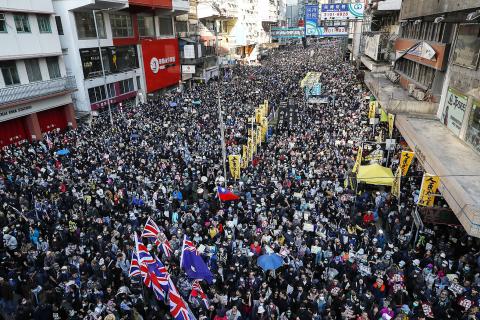Hundreds of thousands of demonstrators yesterday crammed into Hong Kong’s streets, their chants echoing off high-rises, in a mass show of support for a protest movement that shows no signs of flagging as it enters a seventh month.
Chanting “Fight for freedom” and “Stand with Hong Kong,” a sea of protesters formed a huge human snake winding for blocks on Hong Kong Island, from the Causeway Bay shopping district to the Central business zone, a distance of more than 2km.
The crowds were so large and dense that the march ground to a standstill at times. Protesters spilled into narrow side streets, crying “Revolution in our times.”

Photo: AP
One protester crawled part of the route prostrated on her hands and knees, dragging bricks and empty soda cans behind her. It was an apt metaphor for the pro-democracy movement, which has become a long-haul push to preserve Hong Kong’s freedoms that make it unique among China’s territories.
“This is just the beginning. We have a long way to run,” said demonstrator Louisa Yiu, an engineer.
Many marchers held up five fingers to press the movement’s five demands. They include democratic elections for Hong Kong’s leader and legislature and a demand for a probe of police behavior during the six months of continuous protests.
Marchers said they hoped the huge turnout might help win concessions from the government of Hong Kong Chief Executive Carrie Lam (林鄭月娥).
Protesters spanned generations. One man’s young son marched in his Spider-man suit.
“So many people are still supporting this movement. You can see how determined Hong Kong people are,” said demonstrator Justin Ng, a 20-year-old student.
“I heard a small kid yelling slogans — four, five years old,” Ng said. “That really encouraged me, because it’s not just this generation, but future generations, too.”
Marchers said protesting has become part of the fabric of their lives since demonstrations erupted in June against a now-withdrawn bill that would have allowed criminal suspects to be sent for trial in Chinese Communist Party-controlled courts in China.
The protests have since snowballed into a broad, sustained anti-government movement, presenting the communist leadership in Beijing with a major headache and battering Hong Kong’s economy.
Police in riot gear deployed in numbers on the edges of the march.
Earlier in the day, they arrested 11 people and seized a cache of weapons, including a firearm with more than 100 bullets.
Police said the suspects apparently planned to use the weapons during the protest to frame police, who have been accused of using excessive force against the protesters.
Civil Human Rights Front vice convener Eric Lai (黎恩灝) called for police restraint and for no use of tear gas.
“We hope this will be a signature for our movement after six months to show to Carrie Lam as well as to the world that people are not giving up. People will still fight for our freedom and democracy,” Lai said.
Chief among the protesters’ complaints yesterday was that police have been overly heavy-handed, making thousands of arrests since June.
“They are out of control,” said Ernest Yau, a 28-year-old consultant.
“We understand our common enemy,” he said. “We understand that we have to be united to fight against China.”

CHAOS: Iranians took to the streets playing celebratory music after reports of Khamenei’s death on Saturday, while mourners also gathered in Tehran yesterday Iranian Supreme Leader Ayatollah Ali Khamenei was killed in a major attack on Iran launched by Israel and the US, throwing the future of the Islamic republic into doubt and raising the risk of regional instability. Iranian state television and the state-run IRNA news agency announced the 86-year-old’s death early yesterday. US President Donald Trump said it gave Iranians their “greatest chance” to “take back” their country. The announcements came after a joint US and Israeli aerial bombardment that targeted Iranian military and governmental sites. Trump said the “heavy and pinpoint bombing” would continue through the week or as long

TRUST: The KMT said it respected the US’ timing and considerations, and hoped it would continue to honor its commitments to helping Taiwan bolster its defenses and deterrence US President Donald Trump is delaying a multibillion-dollar arms sale to Taiwan to ensure his visit to Beijing is successful, a New York Times report said. The weapons sales package has stalled in the US Department of State, the report said, citing US officials it did not identify. The White House has told agencies not to push forward ahead of Trump’s meeting with Chinese President Xi Jinping (習近平), it said. The two last month held a phone call to discuss trade and geopolitical flashpoints ahead of the summit. Xi raised the Taiwan issue and urged the US to handle arms sales to

State-run CPC Corp, Taiwan (CPC, 台灣中油) yesterday said that it had confirmed on Saturday night with its liquefied natural gas (LNG) and crude oil suppliers that shipments are proceeding as scheduled and that domestic supplies remain unaffected. The CPC yesterday announced the gasoline and diesel prices will rise by NT$0.2 and NT$0.4 per liter, respectively, starting Monday, citing Middle East tensions and blizzards in the eastern United States. CPC also iterated it has been reducing the proportion of crude oil imports from the Middle East and diversifying its supply sources in the past few years in response to geopolitical risks, expanding

Pro-democracy media tycoon Jimmy Lai’s (黎智英) fraud conviction and prison sentence were yesterday overturned by a Hong Kong court, in a surprise legal decision that comes soon after Lai was jailed for 20 years on a separate national security charge. Judges Jeremy Poon (潘兆初), Anthea Pang (彭寶琴) and Derek Pang (彭偉昌) said in the judgement that they allowed the appeal from Lai, and another defendant in the case, to proceed, as a lower court judge had “erred.” “The Court of Appeal gave them leave to appeal against their conviction, allowed their appeals, quashed the convictions and set aside the sentences,” the judges